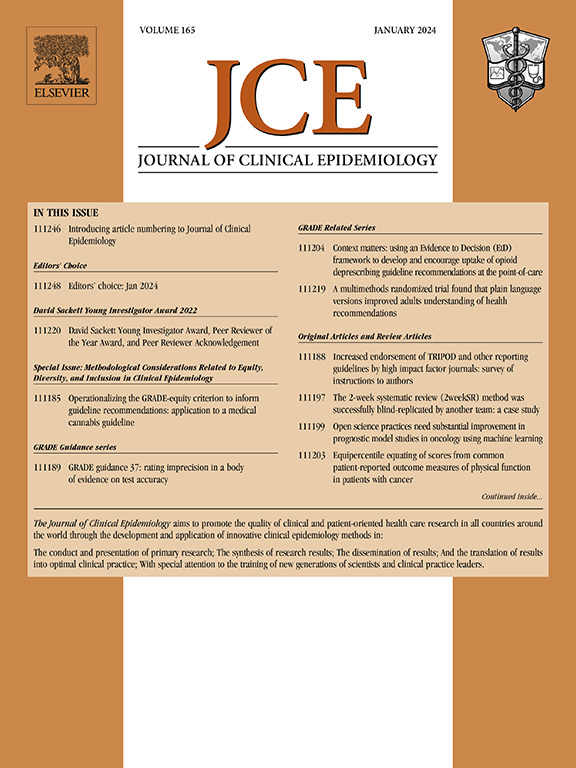专家调查,确定发现问题研究的方法:INSPECT-SR 项目第 1 阶段。
IF 5.2
2区 医学
Q1 HEALTH CARE SCIENCES & SERVICES
引用次数: 0
摘要
背景:随机对照试验(RCT)为医疗决策提供依据。遗憾的是,一些已发表的随机对照试验包含虚假数据,有些似乎完全是捏造的。系统综述的目的是识别和综合针对特定主题进行的所有随机对照试验。这意味着任何这些 "有问题的研究 "都有可能被包括在内,但目前还没有公认的方法来识别它们。INSPECT-SR 项目正在开发一种工具,用于识别医疗保健相关干预措施系统综述中存在问题的 RCT。该工具将引导用户通过一系列 "检查 "来确定研究的真实性。开发过程中的第一个目标是收集一份全面的检查清单,以便在纳入研究时加以考虑:方法:我们收集了一份评估研究真实性的初步检查清单,不局限于 RCT,并将其分为五个领域:检查论文结果;检查研究团队;检查行为、管理和透明度;检查文本和出版细节;检查参与者个人数据。我们以在线调查的形式实施了这份清单,并通过专业网络和在线论坛邀请在评估潜在问题研究方面拥有专业知识和经验的人员参与其中。我们邀请参与者就清单中的检查内容提供反馈意见,并要求他们描述他们所知道的、清单中没有列出的其他检查内容:结果:来自五大洲 16 个国家的 71 位参与者就 102 项检查的初步清单提供了广泛的反馈意见。在五个领域中提出了 14 项新的检查,并对初始清单中的检查提出了重新措辞的建议。更新后的检查清单由 116 项检查组成。许多与会者表示不熟悉统计核查,并强调了工具可行性的重要性:结论:已经编制了一份全面的可信度检查清单。将对这些检查进行评估,以确定哪些检查应纳入 INSPECT-SR 工具。本文章由计算机程序翻译,如有差异,请以英文原文为准。
A survey of experts to identify methods to detect problematic studies: stage 1 of the INveStigating ProblEmatic Clinical Trials in Systematic Reviews project
Background and Objective
Randomized controlled trials (RCTs) inform health-care decisions. Unfortunately, some published RCTs contain false data, and some appear to have been entirely fabricated. Systematic reviews are performed to identify and synthesize all RCTs which have been conducted on a given topic. This means that any of these ‘problematic studies’ are likely to be included, but there are no agreed methods for identifying them. The INveStigating ProblEmatic Clinical Trials in Systematic Reviews (INSPECT-SR) project is developing a tool to identify problematic RCTs in systematic reviews of health care-related interventions. The tool will guide the user through a series of ‘checks’ to determine a study's authenticity. The first objective in the development process is to assemble a comprehensive list of checks to consider for inclusion.
Methods
We assembled an initial list of checks for assessing the authenticity of research studies, with no restriction to RCTs, and categorized these into five domains: Inspecting results in the paper; Inspecting the research team; Inspecting conduct, governance, and transparency; Inspecting text and publication details; Inspecting the individual participant data. We implemented this list as an online survey, and invited people with expertise and experience of assessing potentially problematic studies to participate through professional networks and online forums. Participants were invited to provide feedback on the checks on the list, and were asked to describe any additional checks they knew of, which were not featured in the list.
Results
Extensive feedback on an initial list of 102 checks was provided by 71 participants based in 16 countries across five continents. Fourteen new checks were proposed across the five domains, and suggestions were made to reword checks on the initial list. An updated list of checks was constructed, comprising 116 checks. Many participants expressed a lack of familiarity with statistical checks, and emphasized the importance of feasibility of the tool.
Conclusion
A comprehensive list of trustworthiness checks has been produced. The checks will be evaluated to determine which should be included in the INSPECT-SR tool.
Plain Language Summary
Systematic reviews draw upon evidence from randomized controlled trials (RCTs) to find out whether treatments are safe and effective. The conclusions from systematic reviews are often very influential, and inform both health-care policy and individual treatment decisions. However, it is now clear that the results of many published RCTs are not genuine. In some cases, the entire study may have been fabricated. It is not usual for the veracity of RCTs to be questioned during the process of compiling a systematic review. As a consequence, these “problematic studies” go unnoticed, and are allowed to contribute to the conclusions of influential systematic reviews, thereby influencing patient care. This prompts the question of how these problematic studies could be identified. In this study, we created an extensive list of checks that could be performed to try to identify these studies. We started by assembling a list of checks identified in previous research, and conducting a survey of experts to ask whether they were aware of any additional methods, and to give feedback on the list. As a result, a list of 116 potential “trustworthiness checks” was created. In subsequent research, we will evaluate these checks to see which should be included in a tool, INveStigating ProblEmatic Clinical Trials in Systematic Reviews, which can be used to detect problematic studies.
求助全文
通过发布文献求助,成功后即可免费获取论文全文。
去求助
来源期刊

Journal of Clinical Epidemiology
医学-公共卫生、环境卫生与职业卫生
CiteScore
12.00
自引率
6.90%
发文量
320
审稿时长
44 days
期刊介绍:
The Journal of Clinical Epidemiology strives to enhance the quality of clinical and patient-oriented healthcare research by advancing and applying innovative methods in conducting, presenting, synthesizing, disseminating, and translating research results into optimal clinical practice. Special emphasis is placed on training new generations of scientists and clinical practice leaders.
 求助内容:
求助内容: 应助结果提醒方式:
应助结果提醒方式:


